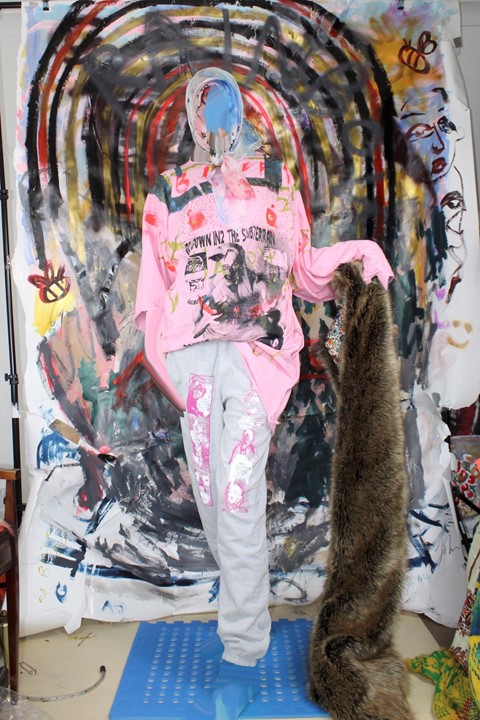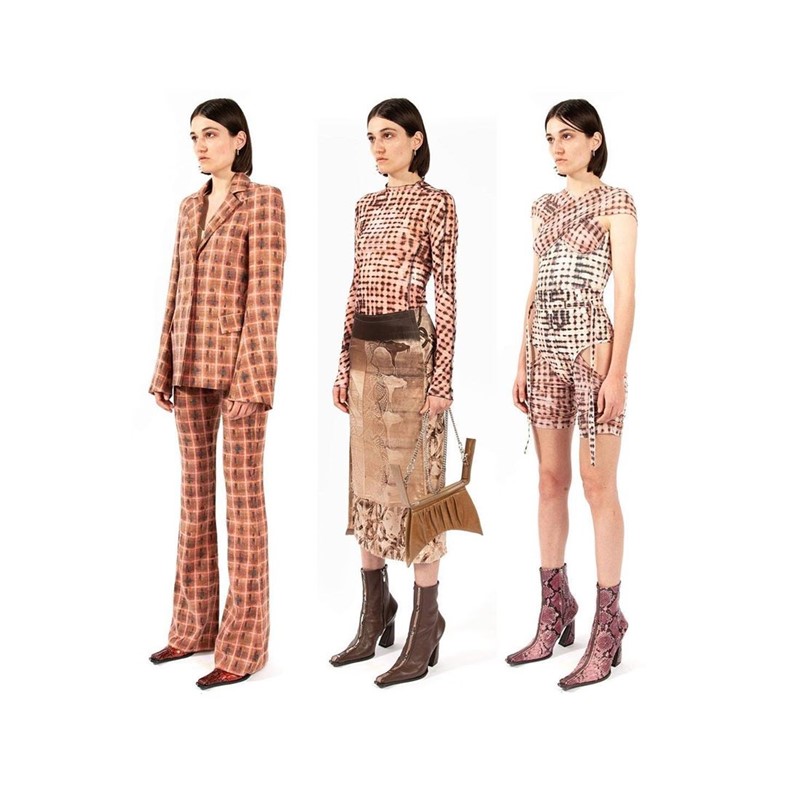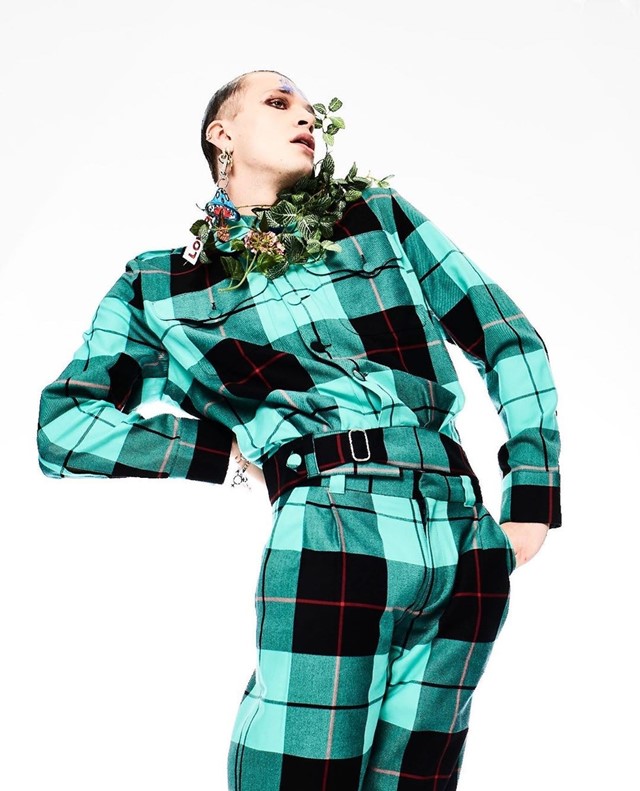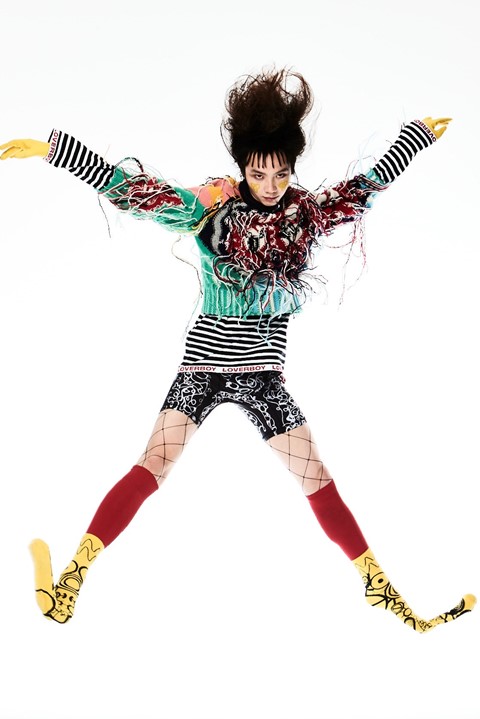The pandemic has made fashion rethink the way it does business. Here, Charlotte Knowles, Matty Bovan and Charles Jeffrey tell us why they have launched e-commerce platforms in the midst of global change
A recent, much-circulated article published in the New York Times, titled Sweatpants Forever, documented the apparent demise of the fashion system as we know it – how, according to its author Irina Aleksander, it had begun to “annihilate itself” as far back as 2008. That, she wrote, was the beginning of the democratisation of fashion: for the first time, people could watch shows on their laptops from wherever they were in the world. But this came with a consequence. As the world tuned in, everything accelerated: in a quest to fuel the ever-growing desire for the new, brands added pre-fall and resort collections; they in turn became marketing opportunities in themselves, and the sheer excess of it all began to cripple those companies who couldn’t afford to keep up. “Then Covid hit,” she writes.
The pandemic put fashion’s dilemma into sharp relief: early on, back in April, the British Fashion Council estimated that 35 per cent of UK-based labels would be out of business in the next three months, and by the end of the year it could be almost half of the entire industry (since, it has established the BFC Foundation Fund, which has seen £1,000,000 go to British fashion businesses in need). Back then, it seemed like London’s emerging designers – most of which had fledgling businesses based on the usual model of selling to stores and showing twice-yearly at fashion week – would be the most affected, lacking the infrastructure of the larger labels which dominate. But something different happened: young British designers and labels were among the quickest to react. They shot lookbooks from their homes or socially distanced studios, or sent out their clothes to friends to shoot themselves, published books and zines, created digital gallery spaces, released films, sold clothing in aid of Black Lives Matter charities. In short, they began to envision a way of working outside the system they had always known.
It also saw a change in the way these designers sold their clothes: in the past few months, numerous London-based designers have opened e-commerce platforms, allowing them to sell direct to their consumers (most of which double as their Instagram followers). It almost immediately showed the potential of skipping stores – many of which had also cancelled orders after the pandemic broke – allowing designers to create a digital space where they could speak directly to their communities. Here, we talk to three of those designers – Charlotte Knowles, Charles Jeffrey and Matty Bovan – who each opened an e-commerce platform during the pandemic, about finding a new way to do business in the midst of global change.

Matty Bovan
“I think like everyone we have taken time to take stock and think about what we are putting out – and leaving – in this world; thinking how we can be sustainable and, as we make everything in the UK, we are trying to discuss how this can support the industry. [We had] always planned [to launch our e-commerce platform] this summer, but with the pandemic it gave me time to sit and really work into these pieces, and put something out there I feel is really interesting, and in a medium that I had to work on solo, so it was all shot by self-timer and on myself.
“As we have launched this new label BOVAN, [the direct-to-consumer model] allows me to explore different products and ideas to my mainline Matty Bovan label. We have a diverse age range of customers and I feel there is something for most price points on the website and so far [it] seems to have been successful. So far [the response has] been great and the feedback has been really positive – people seem so happy with the products which is really great to hear directly.
“I really hope that all the positive change [from this crisis] sticks and that brands and people really think about what and how they consume. I am keeping as positive as I can be, but of course I have fears and concerns, with such a loss of life globally – it really does make you think about your own life, and your own actions in the world, so I hope this is going to make the industry more caring, more sustainable and more diverse as a whole. We have to keep positive and creativity is going to be key in the future, for myself personally, and I think for a lot of people.”

Charlotte Knowles
“[At the start of the pandemic] we had a bit of a panic moment, we were quite lucky that most of our retailers had an online platform. We had to really take a step back and think about the company in a more ‘business’ way, make a new business plan and figure out a critical path to survive, which was super helpful.
“We had been working on [the e-store] for a while with 11.12 – who developed the whole website and art directed it for us, they are amazing – so it was always in the works and part of our budgeting, we just never had a chance to spend time making it happen. The pandemic also made us realise the importance of having a pillar to your brand that you are in control of. Plus, it is always nice to have a direct link to our customers and when they buy something from us it reminds us how lucky we are to have people believing in our brand and buying our clothes. We’ve had a very good response so far, as it was pieces from S/S20 that people either couldn’t get in stores or were sold out. I hope all of them are happy with their purchases!
“The advantage from a business perspective is steady cash flow, which any business struggles with if they work through wholesale without investment. And it’s always great to be able to have that direct contact with people who buy our clothes, and in the future hopefully we can spend even more time working on the platform and fortifying those links.
“We hear a lot of things left and right [about fashion’s future]; people seem to have a very decisive opinion on what will happen, but we just are trying to adapt, really. We will just do what we believe in and hope to make fashion’s future better! Change shouldn’t just be on the surface but come from much deeper in the industry to have a real impact.”

Charles Jeffrey
“Since we are a nimble team of five, we were able to adapt very quickly and efficiently [to the pandemic]. We didn’t need to put anyone on furlough or have to make any painful sacrifices, in my opinion. We began by all working from home and Zooming like everyone else but now the studio is back to a form of normal, with people coming in when they need to and some still Zooming in. What we adapted was what our collections look like: the size, style and ‘efficiency’ of them, what do our customers want to see from us, what do we all like wearing at the moment, what has longevity and timelessness. I feel instead of trying to push the boundary of what a show or collection could be, it’s just what feels right for us right now.
“The e-store was always in the pipeline, and a natural progression for most businesses like mine. Covid-19 just made us realise how interesting a space it could be for our work to exist outside of a physical show or showroom space, or even retail for that matter – with some stores obviously compromised. I have always thought the LOVERBOY website should be more than just a shopping space, I want it to be a ‘virtual experience’ – a space that people would want to hang out in and listen to or play with, maybe even shop too! It’s just the perfect time to do one, a great tool to engage with your customers on a much more personal level.
“We basically made what an average store buy would be in the space of three days, which is great! The hard work now is to sustain interest and keep interesting things happening on the site. It’s a full-time job role that we currently have to share between us for now. We don’t want it to become stagnant and I also want to add other arms to it, specifically an editorial, musical, article-based space which people can come to and read, listen and engage with. It is so fun thinking about all the possibilities this space has now for us!
“I’m just so glad to see the conversations we are having right now about diversity, inclusivity, and the fact people are not taking any bullshit anymore. It feels so punk and refreshing! We need to keep it coming and push more buttons and look at ourselves and what we are doing in a more personal and local way with regards to manufacturer collaboration and sustainability. I feel super hopeful and positive about the future.
“[One positive thing to come out of the pandemic would be] no more bullshit. Let’s all look in the mirror and be honest about what we are not doing and just make new connections and ways of working that can help include new voices and beautiful new experiences.”
